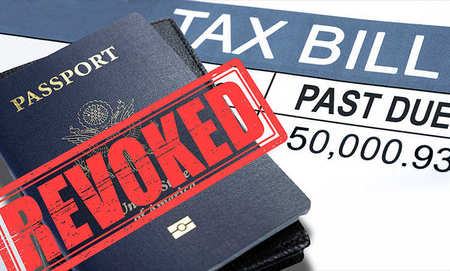 Since
2015, when the Fixing American’s Surface Transportation Act was passed by
Congress, world travelers who owe the IRS money have found that it’s no fun to
owe a tax debt. In fact, it can ground any and all international travel plans
indefinitely.
Since
2015, when the Fixing American’s Surface Transportation Act was passed by
Congress, world travelers who owe the IRS money have found that it’s no fun to
owe a tax debt. In fact, it can ground any and all international travel plans
indefinitely.
…FAST
Act is Section 7345 of the Internal Revenue Code, which requires the IRS to
provide information to the U.S. State Department about people who owe
“seriously delinquent tax debt.” Then, the State Department can deny, revoke or
limit the ability of these individuals to use their passports – until they are
back in good standing with the IRS.
The
following 10 Q & A points about the FAST Act, also from Buttonow’s report
linked above, are quoted and summarized in a more abbreviated form so that you
can quickly digest the main points of how the FAST Act could affect you if you
owe taxes:
1.
What is the new passport-restriction program (IRC Section 7345)?
IRC
Section 7345 requires the IRS to identify and “certify” individuals who have
“seriously delinquent tax debt,” and provide this certification to the State
Department. In turn, the State Department can essentially limit or completely
stop the individual’s travel plans outside the US until the would-be traveler
gets into good standing with the IRS.
2.
Why did Congress create passport restrictions?
In
2011, the Government Accountability Office issued a report that
examined the potential for using passports to increase tax-debt collection. The
report found that 224,000 people who owed collectively more $5.8 billion in
unpaid federal taxes received passports in 2008.
The
report recommended that Congress enable a more coordinated effort between the
IRS and State Department to go after these unpaid taxes, using passports as
leverage. The report received a lot of national press, and the link between
federal tax debt collection and passports became law in 2015.
3. Who is Affected?
The
passport restriction will affect people who travel internationally and owe
seriously delinquent tax debt. This includes people with passports and those
applying for or renewing passports.
Who
is an individual with seriously delinquent tax debt? Section 7345 defines this
person as owing a legally enforceable tax liability of more than $50,000
(unpaid taxes, penalties and interest combined), with:
- A lien filed, and all
administrative remedies for lien relief have lapsed or been denied;
- or, a levy issued.
There
are certain exceptions. The IRS won’t consider people in the following
situations to be individuals with seriously delinquent tax debt, because these
people are in good standing with the IRS:
- People who are in an
IRS installment agreement to pay their taxes.
- People who have
settled their debt through an offer in compromise or Justice Department
agreement.
- People who appeal a
levy through an IRS collection due process hearing.
- People who request
innocent spouse relief (Form 8857).
Based
on this list of exceptions, the way to avoid being certified by the IRS as an
individual with seriously delinquent tax debt is to get into an agreement with
the IRS to pay the balance.
4.
What will happen to the person who owes seriously delinquent tax debt?
Before
the State Department revokes a passport, the State Department may limit the
passport so that the individual can only travel back to the United States. It’s
unclear how the State Department will use its discretion on limiting and
revoking passports.
5.
How can taxpayers get their passport restrictions lifted?
To
get out of the passport restriction, individuals must get back into good
standing with the IRS. For most taxpayers, that will mean paying the entire tax
bill or, more likely, setting up an installment agreement with the IRS.
6.
Can taxpayers just pay the balance to under $50,000 to remove the certification
and passport restrictions?
The
short answer from the IRS is no. Just reducing the amount under $50,000 will
not decertify the taxpayer.
7.
Can taxpayers appeal their seriously delinquent tax debt certification?
Under
Section 7345(e), taxpayers can appeal their status in federal district court or
U.S. Tax Court. But the taxpayers’ passports will remain restricted while they
appeal. For taxpayers who are surprised by their passport restrictions when
they try to travel, the best way to expedite travel is to obtain a quick
installment agreement.
8.
What if taxpayers don’t think they owe the tax?
To
get immediate relief, the only quick option is for taxpayers to pay the
balance, or more likely, set up an installment agreement, and contest the tax
later with the IRS.
9.
Is there an expedited process to remove passport restrictions?
Right
now, there’s no provision to expedite removal of passport restrictions after a
taxpayer gets in good standing with the IRS. As the law is implemented,
look for the IRS and the State Department to develop expedited procedures to
relieve taxpayer burden.
10.
What can a seriously delinquent tax debtor do to avoid passport restrictions?
Basically,
taxpayers can avoid passport restrictions by meeting an exception outlined
above – all of which mean getting into good standing with the IRS.
As
Buttonow makes clear in his report: don’t assume it’s safe to make travel plans
if you owe taxes. There are problematic ramifications of not being in good
standing with the IRS when you intend to use your passport to travel outside
the country.
For
this reason, we highly recommend you meet with your CPA as part of your
pre-trip planning process to put in place payment arrangements with the IRS
sufficiently in advance of taking your trip.
 One of my favorite sayings is “the only constant is change.” This saying certainly holds true in the business realm where it seems that the mandate is also “growth and go.”
One of my favorite sayings is “the only constant is change.” This saying certainly holds true in the business realm where it seems that the mandate is also “growth and go.”





